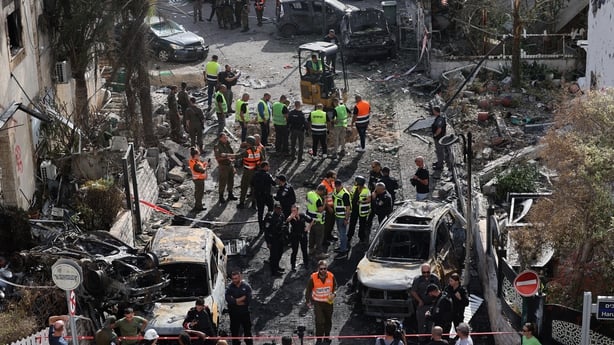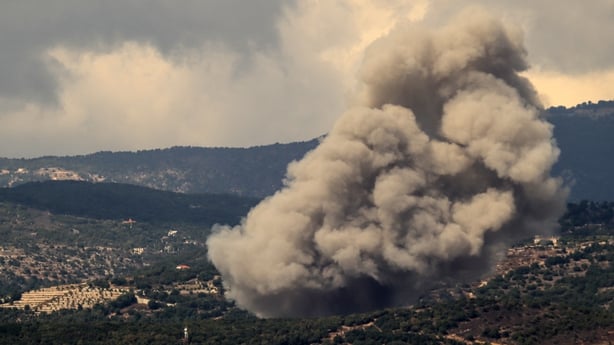Hezbollah and Israel Engage in Intense Gunfire Following Fatal Attack
An intense exchange of fire has erupted between Israel and Hezbollah, marking one of the most severe bouts of violence in nearly a year. Israeli military jets have executed extensive bombings across the southern regions of Lebanon, while Hezbollah has retaliated with rockets aimed deep into northern Israel.
The Israeli armed forces reported striking approximately 290 locations yesterday, including a multitude of identified Hezbollah rocket launchers. They declared their intent to persist in targeting positions linked to the Iran-backed group.
- Advertisement -
This morning, in response to the escalating tensions, Israel implemented school closures and imposed gathering restrictions in various northern locales, including the Israeli-occupied Golan Heights.
Throughout the night, air raid sirens pierced the silence as a barrage of missiles and rockets launched from both Lebanon and Iraq. Most of these projectiles were intercepted by Israel’s air defense systems, according to military reports.

Emergency services treated numerous injuries, but thankfully, there were no fatalities reported, as residents heeded warnings to remain close to shelters and secure rooms.
Hezbollah claimed responsibility for targeting Ramat David Airbase with a barrage of missiles. This action was justified as a reaction to “repeated Israeli aggressions against Lebanon,” shared the group on its Telegram channel early Sunday.
This latest rocket barrage marks Hezbollah’s most significant response in scope since the onset of the hostilities.
The conflict escalated dramatically over the last week after Hezbollah opened a new front against Israel, coinciding with Israel’s ongoing war against Hamas in Gaza. This was triggered by the shocking Hamas-led assault in southern Israel on October 7.
A representative from the Islamic Resistance in Iraq, a coalition of Iran-aligned militant factions, announced their launch of cruise missiles and explosive drone strikes targeting Israel at dawn on Sunday. This action is part of what they described as “a new chapter in our support for Lebanon.”
“As tensions rise in Lebanon, expect the repercussions to be felt beyond its borders,” the official stated.
UN special coordinator for Lebanon, Jeanine Hennis-Plasschaert, echoed concerns on social media, stating, “With the region precariously perched on the edge of disaster, it is crucial to recognize that there is NO military alternative that guarantees safety for either side.”
These intensifying attacks follow closely on the heels of an Israeli airstrike that specifically targeted Hezbollah leaders in a suburb of Beirut.

The Lebanese health ministry reported that the death toll from that air raid has climbed to 45. Among those lost were 16 Hezbollah members, including prominent leaders Ibrahim Aqil and Ahmed Wahbi, marking the deadliest incident in nearly a year of confrontations with Israel.
According to Israel’s military, the strike targeted a clandestine assembly of Aqil and senior figures from Hezbollah’s elite Radwan forces, claiming to have nearly crippled their military command structure.
This assault leveled a high-rise residential building and seriously damaged a daycare center nearby, according to security sources. The toll from this event included three children and seven women, as reported by the health ministry.
Friday’s strike inflicted substantial damage on Hezbollah, following a recent series of attacks that resulted in the detonation of communication devices used by its operatives. The total casualties from these earlier assaults, widely attributed to Israeli action, reached 39, with over 3,000 wounded. Israel has neither confirmed nor denied any involvement.
In its quest for retaliation for last week’s attacks, Hezbollah announced via Telegram that it had targeted Israeli military-industrial sites with rockets.
The Israeli military quickly countered with strikes aimed at Hezbollah positions in Lebanon, as noted in an official statement.
Hezbollah affirmed its determination to persist in hostilities against Israel until a ceasefire is established in Gaza.
U.S. officials foresee that such a ceasefire remains a distant prospect. Israel is pushing for Hezbollah to halt its aggression and pull back its forces from the border territory in accordance with a UN resolution from 2006, irrespective of developments in Gaza.
In northern Israel, the military heightened alerts for local residents and restricted public gatherings. The alert now extends as far south as Haifa, indicating Israel’s fear that Hezbollah might launch strikes deeper into its territory following the renewed conflict with Hamas.
Southern Lebanese residents recounted massive explosions that illuminated the night sky and rattled the earth as Israeli forces executed their latest airstrikes.
Israeli Defense Minister Yoav Gallant tweeted last week that Israel has embarked on a new phase of its military campaign along the northern border, asserting, “The sequence of operations in this new phase will persist until our objectives are met: ensuring the safe return of northern residents to their homes.”
Since Hezbollah’s rocket assaults commenced in October—in solidarity with Palestinians in Gaza—tens of thousands have evacuated their homes, seeking safety on both sides of the Israel-Lebanon border.
A communiqué from a recent U.S. summit, presided over by President Joe Biden alongside leaders from Japan, India, and Australia, underscored the necessity of preventing the Gaza conflict from escalating into a broader regional crisis, although it did not explicitly address the Israel-Hezbollah situation.
With the ongoing strife, at least 70 individuals in Lebanon have lost their lives in just the past week, pushing the total death toll in the nation to over 740 since October—the deadliest escalation in the long-standing Israel-Hezbollah confrontation since the 2006 war.
